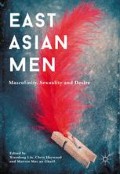Abstract
This chapter examines the articulation of queer politics in contemporary China by using the public performance of a “‘same-sex wedding” event that took place in Beijing one Valentine’s Day as a case study. It suggests that queer activism in China today has developed new forms of practices that recognize both the impact of the transnational Lesbian, Gay, Bisexual and Transgender (LGBT) movement and the cultural specificities of Chinese society. These practices include performative enactment of the body and identity, constant negotiations between visibility and invisibility, and the strategic deployment of the public space. All these practices are underpinned by a non-dogmatic and culturally sensitive understanding of identity and politics that has significant implications for queer theory and queer politics today.
Access this chapter
Tax calculation will be finalised at checkout
Purchases are for personal use only
Notes
- 1.
This remains controversial. Guo Xiaofei (2007) points out that the deletion of “hooliganism” in China’s 1997 Criminal Law did not aim to decriminalize homosexuality, although in effect it produced an unexpected result that seemed to have decriminalized homosexuality. Also, the 2001 version of the Chinese Classification of Mental Disorder (CCMD-3) stated that only those “self-discordant” (ziwo buhexie 自我不和谐) homosexuals need to seek medical treatment. This is not a complete depathologization, either.
- 2.
I use the Chinese term chang 场 here to indicate an assemblage of bodies, emotions and affects that work together at a particular time and place to produce certain effects. In Taoism, chang is always associated with qi 气 (free-flowing energies characterised by yin 阴 and yang 阳) and referring to a terrain of such energies that accumulate, reform, transform and disintegrate. Please note that chang should be understood as multiple, contingent, and fluid. Chang affects and is deeply affective.
The most commonly-used Chinese term for gays and lesbians is tongxinglian (同性恋 lit. same-sex love, meaning homosexual). Tongxinglian is gendered male by default. When it refers to female, a character, nü, (女, meaning female) is used, as in the term nü tongxinglian (女同性恋 lit. female same-sex love, meaning lesbians).
- 3.
Many gays and lesbians use pseudonyms, cyber names, or English names in the gay community. Only a few out public personas use their real Chinese names in LGBT public events. This is generally considered as understandable and necessary by people in the community. The politics of “naming” and identities is an interesting issue that requires separate treatment elsewhere.
- 4.
Tian’anmen means “the gate of heavenly peace” and Qianmen means “the front gate” in Chinese.
References
Althusser, L. (1969). For Marx. London: Allen Lane.
Altman, D. (2001). Global sex. Chicago: University of Chicago Press.
Butler, J. (1990). Gender trouble. London: Routledge.
Butler, J. (2005). Bodies that matter. London: Routledge.
Certeau, D., & Michel (1984). The practice of everyday life. Berkeley: University of California Press.
Foucault, M. (1979). Discipline and punish: The birth of the prison. New York: Vintage Books.
Goffman, E. (1973). The presentation of self in everyday life. New York: Overlook Press.
Gonesko, G. (Ed.) (1996). The Guattari reader. Oxford: Wiley-Blackwell.
Guo, X. (2007). Zhongguo fa shiye xiade tongxinglian (Homosexuality in the gaze of Chinese law). Beijing: Zhishi chanquan shubanshe.
Habermas, J. (1992). The structural transformation of the public sphere: An inquiry into a category of bourgeois society. Cambridge: Polity Press.
Ho, L. W. W. (2010). Gay and lesbian subculture in urban China. London, New York: Routledge.
Levinas, E. (1979). Totality and infinity: An essay on exteriority, Martinus Nijhoff philosophy texts. In The Hague. Boston: M. Nijhoff Publishers.
Martin, F. (2000). Surface tensions: Reading production of Tongzhi in contemporary Taiwan. GLQ: A Journal of Lesbian and Gay Studies, 6(1), 61–86.
Martin, F. (2003). Situating sexualities: Queer representation in Taiwanese fiction, film and public culture. Hong Kong: Hong Kong University Press.
Probyn, E. (2005). Blush: Faces of shame. Sydney: University of New South Wales Press.
Robinson, L. (2015). To whom our bodies belong? Beijing queer in Chinese DV documentary. In Z. Zhen & A. Zito (Eds.), DV-made China: Digital subjects and social transformations after independent film. Honululu: University of Haiwai’i Press.
Sedgwick, E. K. (1990). Epistemology of the closet. Berkeley: University of California Press.
Sedgwick, E. K. (2003). Touching feeling: Affect, pedagogy, performativity, Series Q. Durham, N.C./London: Duke University Press.
Warner, M. (2000). The trouble with normal: Sex, politics, and the ethics of queer life (1st pbk. ed.). Cambridge, MA: Harvard University Press.
Williams, R. (1977). Marxism and literature. Oxford: Oxford University Press.
Yang, M. (1999). Spaces of their own: Women’s public space in transnational China. Minneapolis: University of Minnesota Press.
Yu, Z. (2009). Hai Bei: Wo de mengxiang jiushi he baima wangzi jiehun (‘Hai Bei: My dream is to marry a prince on a white horse’) Dian (‘Gayspot’) 9.
Author information
Authors and Affiliations
Editor information
Editors and Affiliations
Copyright information
© 2017 The Author(s)
About this chapter
Cite this chapter
Bao, H. (2017). “Same-Sex Wedding”, Queer Performance and Spatial Tactics in Beijing. In: Lin, X., Haywood, C., Mac an Ghaill, M. (eds) East Asian Men. Palgrave Macmillan, London. https://doi.org/10.1057/978-1-137-55634-9_7
Download citation
DOI: https://doi.org/10.1057/978-1-137-55634-9_7
Published:
Publisher Name: Palgrave Macmillan, London
Print ISBN: 978-1-137-55633-2
Online ISBN: 978-1-137-55634-9
eBook Packages: Social SciencesSocial Sciences (R0)

